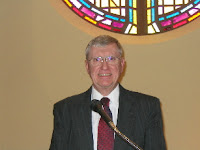“Our substitute, then, who
took our place and dies our death on the cross, was neither Christ alone (since
that would make him a third party thrust in between God and us), nor God alone
(since that would undermine the historical incarnation) but God in Christ, who was truly and fully
both God and man and who on that account was uniquely qualified to represent
both God and man and to mediate between them. If we speak only of Christ
suffering and dying, we overlook the initiative of the Father. If we speak only
of God suffering and dying, we overlook the mediation of the Son.”
~ John Stott, The
Cross of Christ, p. 156.
Sunday, February 28, 2016
Sunday, February 21, 2016
For The Lord's Day - Second Sunday in Lent
“Nothing
makes God more supreme and more central in worship than when people are utterly
persuaded that nothing – not money or prestige or leisure or family or job or
health or sports or toys or friends – nothing is going to bring satisfaction to
their sinful, guilty, aching hearts besides God. This conviction breeds a
people who go hard after God on Sunday morning. They are not confused about why
they are in a worship service. They do not view songs and prayers and sermons
as mere traditions or mere duties. They see them as means of getting to God or
God getting to them for more of his fullness – no matter how painful that may
be for sinners in the short run.” ~ John Piper in God’s Passion for
His Glory
Sunday, February 14, 2016
For The Lord's Day
What happened at the cross?
“At the cross in holy love
God through Christ paid the full penalty of our disobedience himself. He bore
the judgment we deserve in order to bring us forgiveness we do not deserve. On
the cross divine mercy and justice were equally expressed and eternally
reconciled. God’s holy love was ‘satisfied.’” John Stott in The Cross of Christ, p. 91
Sunday, February 7, 2016
For The Lord's Day
“Trust
is not a passive state of mind. It is a vigorous act of the soul by which we
choose to lay hold on the promises of God and cling to them despite the
adversity that at times seeks to overwhelm us.” Psalm 56:3 “When I am afraid, I
will trust in you.” Jerry Bridges in Trusting
God
Sunday, January 24, 2016
For The Lord's Day
“…when we say ordinary means
of grace-based ministry, we mean a radical commitment to following the
direction of God’s Word as to both the message and the means of gathering and
perfecting the saints. Ordinary means ministry has a high view of the Bible, preaching,
the church, the ordinances or sacraments, and prayer. Ordinary means ministry
believes that the key things that the church can do in order to help their
people know God and grow in their knowledge of God are: First, emphasize the
public reading and preaching of the Word; second, emphasize the confirming,
sanctifying and assuring efficacy of the sacraments, publicly administered;
and, third, emphasize a life of prayer, especially expressed corporately in the
church. These things are central and vital but sadly often under-emphasized,
underappreciated, and undermined.”
- - Dr. Ligon Duncan in Tabletalk, October 2007
Chancellor, Reformed Theological Seminary, Jackson, MS
Sunday, January 17, 2016
For The Lord's Day
How to avoid a wasted life:
“God created me – and you – to live with a single, all-embracing,
all-transforming passion – namely, a passion to glorify God by enjoying and
displaying his supreme excellence in all the spheres of life. Enjoying and
displaying are both crucial. If we try to display the excellence of God without
joy in it, we will display a shell of hypocrisy and create scorn or legalism.
But if we claim to enjoy his excellence and do not display it for others to see
and admire, we deceive ourselves, because the mark of God-enthralled joy is to
overflow and expand by extending itself into the hearts of others. The wasted
life is the life without a passion for the supremacy of God in all things for
the joy of all peoples. -- Don’t
Waste Your Life, John Piper
Subscribe to:
Posts (Atom)



